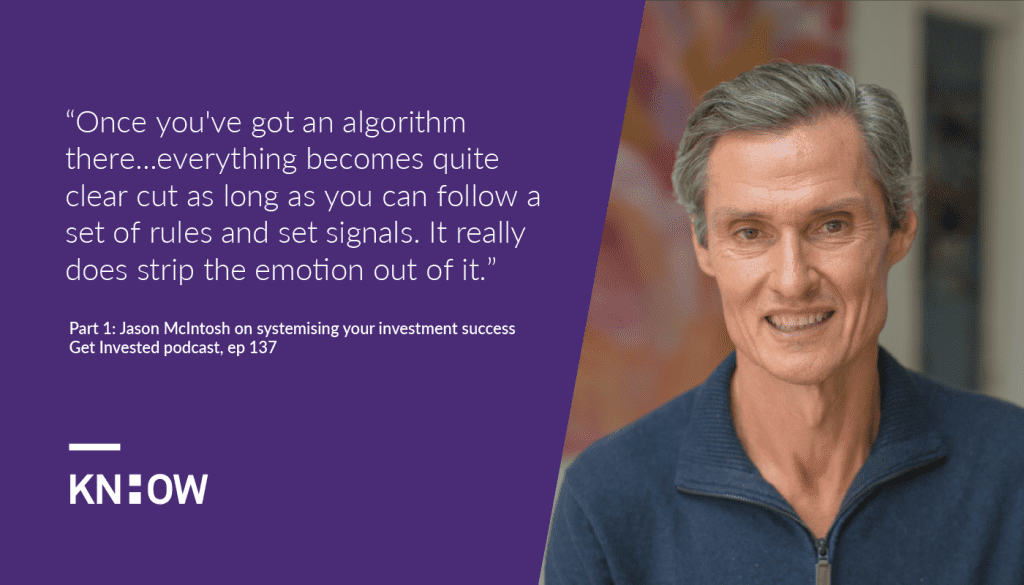Investment success relies on building an investing system with set rules and principles that eliminate your emotions from decisions, says Jason McIntosh.
Many investors can fall victim to self-sabotaging habits, such as focusing on when to buy and getting caught up on emotions.
However, Jason McIntosh has developed an algorithm-based investing system that ensures individuals are profiting in the medium to long term.
The creator of Motion Trader, an online advisory service for retail investors and SMSFs, said investors can often make common mistakes that amount to huge losses.
“I hear from people who have been investing in stocks for years, but without success. So it could be like 10, 20, 30 years in some cases. And it often turns out that you’re just missing maybe one or two pieces of the puzzle, and those pieces, they usually have something to do with selling,” Jason told KnowHow founder Bushy Martin on the Get Invested podcast.
“So either they’re holding onto their bad investments too long, or perhaps they’re selling the good ones too early. And in some cases, it’s a matter of they sell their good investments way too late and they give back big profits in the process.”
Jason explained that one of the keys to investing is adopting a suitable style which defines what you’re going to invest in and how.
“You’ve got to decide why you’re doing something. So before you decide, ‘OK, I’m going to try and invest in stocks’, ask ‘why am I doing that?’ Am I doing it because I want it as a growth asset or an income source, because that will affect what you invest in. Or, you’re doing it because you like the intellectual challenge of finding ideas and testing them and turning them into like a systemised process,” he said.
“Or, you’re doing it because it’s just exciting. Things are moving and it’s all very quick and you buy something, then you sell something and it’s go, go. That’s sort of really the wrong reason. That’s sort of like a day at the races, and it doesn’t usually end well. And yet I see it every investment cycle.
“It is having the sense to go ‘right, well, this is going to suit me in the way I think and way I act and therefore it’s more likely to do better’, rather than chasing the perceived excitement or the perceived big wins that you’re likely to get out of something.”
“The need to do something, the money burning the hole in the pocket, it just causes people to do stuff which they really shouldn’t. Just wait until you get the right opportunity and then hit it, rather than sort of like try and jump ahead and do something that’s not there to be done,” he said.
Another effective strategy Jason described was to use an algorithmic system and a set of rules and pre-defined measures to take your personality out of the equation.
“When you take things to an algorithmic level, you open up your world of possibility exponentially,” he said.
“It sounds a lot more complicated than it actually is. So a set of algorithms is essentially a list of instructions for a computer. And if an investor can clearly define their approach and what they’re doing, then that can be transformed into computer language or algorithms. And that’s really all it is.
“And one of the great things, if you have a list of algorithmic rules in a computerised system, is that you can get a whole lot of historical data and then you can start testing your ideas.
“Once you take those ideas from your head and put them into code, you can then test the over many decades and say, look, do they actually work? Had they worked in the past? Because if they worked in the past, there’s a good probability that they’ll they’ll work in the future.
“if you’re not algorithmic, it can still mess with you. You can freeze under pressure or it’s something you should have really held. But once you’ve got an algorithm there and your calculator levels, well, everything becomes quite clear cut as long as you can follow a set of rules and set signals. It really does strip the emotion out of it.”
Finally, Jason emphasised that investors also need to take on the right mindset and attitude towards successes and losses in order to profit.
“So, most people would look at a win rate and think that unless there’s a high success rate, it mustn’t be very good … it doesn’t matter whether I’m right or wrong. All that matters is how much I make when I’m right versus how much I lose when I’m wrong,” he said.
“You’ve got to understand this. Unless you understand that, you’re going in with the wrong mindset and you’re probably destined to hit the rocks because you’re going to be thinking, ‘well, none of this is working’, but it actually might be. But you don’t understand the process.”
Listen to the full interview here.
Want to Know How you can build wealth with the help of leading, qualified experts? Talk to the team at KnowHow, now.




